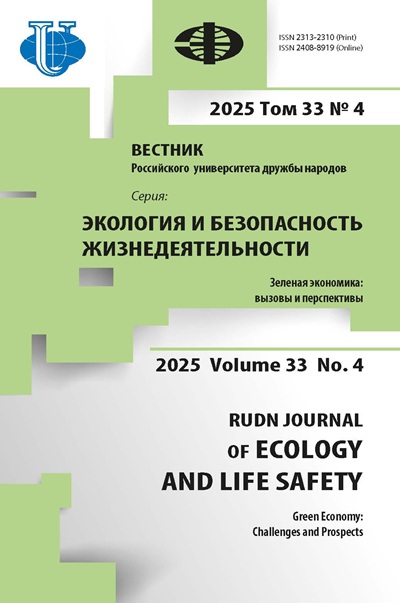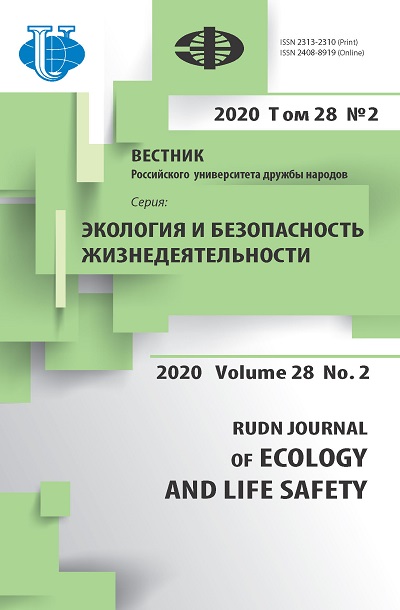Anthropogenic impact on the Himalayan marmot population in Nepal
- Authors: Nikolskii A.A.1, Vanisova E.A.1
-
Affiliations:
- Peoples’ Friendship University of Russia (RUDN University)
- Issue: Vol 28, No 2 (2020)
- Pages: 153-159
- Section: Ecology
- URL: https://journals.rudn.ru/ecology/article/view/25643
- DOI: https://doi.org/10.22363/2313-2310-2020-28-2-153-159
- ID: 25643
Cite item
Full Text
Abstract
Anthropogenic impact on the Himalayan marmot population in Nepal is discussed. Above the upper border of the forest, human shares the same habitats with marmots on the alluvial terraces of river valleys. Human buildings and farmland lead to fragmentation of the marmot population, and overgrazing leads to pasture digression, worsening the food supply of these rodents. At the same time, people regularly catch marmots with loops, while, in accordance with the criteria of the IUCN Red List, the population of the Himalayan marmot in Nepal should be classified as Endangered (EN) - a very high risk of extinction in the wild.
Full Text
Гималайский сурок (Marmota himalayana Hodgson, 1841) - один из наиболее высокогорных видов млекопитающих. Основная область распространения гималайского сурка находится в Цинхай-Тибетском нагорье в Китае [1; 2]. В Гималаях проходит южная граница его распространения и южная граница распространения рода Marmota [3]. Проникновение вида далеко на юг стало возможным благодаря высокому поднятию Гималаев, в результате которого между верхней границей леса (около 3500 м над уровнем моря) и снеговой линией (около 5500 м над уровнем моря) образовалось огромное пространство, пригодное для обитания сурков. Гималайский сурок является одним из главных средообразующих факторов высокогорных экосистем. Как и другие виды сурков, гималайский сурок оказывает мощное воздействие на ландшафт благодаря уникальной роющей деятельности. Для зимней спячки, которая длится более полугода, эти грызуны роют глубокие норы в мелкоземе, широко распространенном в горах. В Гималаях из-за сложного высокогорного ландшафта сурки распространены крайне неравномерно, в основном в Центральном Непале. Одно из поселений гималайского сурка находится в долинах горного массива Манаслу. Здесь широко распространены аллювиальные террасы, с мощным слоем мелкозема и хорошо сформированными почвами, что создает благоприятные условия как для обитания человека, так и для жизни сурков [4]. В этих относительно благоприятных условиях люди занимаются скотоводством, выращивают ячмень и картофель. Использование общего пространства выше верхней границы приводит к тому, что люди не только вытесняют сурков, расширяя хозяйственную деятельность, но и активно преследуют их, что ставит под угрозу само существование сурков в Гималаях. В одном из таких поселений, в окрестностях деревни Сама, весной 2004 г. были проведены полевые наблюдения над экологией гималайского сурка. Одна из задач состояла в том, чтобы выявить основные формы воздействия человека на популяцию сурков, поселение которых находится в долине реки Ларке, на высоте около 3500 м над уровнем моря, у верхней границы леса. Как показано на рис. 1, поселение сурков сильно фрагментировано сельскохозяйственными угодьями человека. Люди постепенно вытесняют сурков с их традиционных мест обитания. В результате распашки происходит уничтожение мест обитания сурков и фрагментация их поселения. Последнее, нарушая поток генов, неизбежно приводит к сокращению генетического разнообразия местной популяции. Рис. 1. Фрагментация поселения и уничтожение мест обитания гималайского сурка под влиянием человека. Все распаханные участки в прошлом были населены сурками. Окрестности деревни Сама в долине реки Ларке. Горный массив Манаслу, Непал [Figure 1. Fragmentation of colonies and destruction of habitat of the Himalayan marmot under the human influence. All plowed territories were inhabited by marmots in the past. The surroundings of the Sama village in the Larke river valley. The Manaslu massif, Nepal] Выровненные участки аллювиальных террас, населенные сурками, люди не только распахивают, но и используют под пастбища. Результатом неумеренного выпаса домашнего скота (в основном яков и лошадей) становится пастбищная дигрессия, сильно подрывающая кормовую базу сурков (рис. 2). Сурки и домашний скот пасутся на одних и тех же участках. Рис. 2. Неумеренный выпас скота приводит к пастбищной дигрессии территории, населенной гималайскими сурками. Гималайский сурок среди многочисленного помета, оставленного домашним скотом [Figure 2. Excessive grazing leads to pasture digression of the territory inhabited by Himalayan marmots. Himalayan marmot is among a lot of excrements left by livestock] Человек воздействует на сурков не только косвенно, через хозяйственную деятельность, но и охотясь на них. Неожиданными оказались сведения о том, что буддисты, монастырь которых расположен в деревне Сама, ловят сурков и, по рассказам местного жителя, используют их в пищу. Гималайский сурок, вероятно, давно входит в культурную традицию Тибета и соседних районов Гималаев, где распространен буддизм. На рынках Непала можно увидеть металлические фигурки гималайского сурка, подобно тому как в некоторых странах Европы обычны игрушки, изображающие европейского сурка, и редко - его металлические фигурки (рис. 3). Рис. 3. Металлические фигурки сурков: слева - европейский сурок (Лион, Франция); справа - гималайский сурок (Катманду, Непал). Высота фигурок - 5 и 3,5 см соответственно [Figure 3. Metal figures of marmots: left - the European marmot (Lyon, France); right - Himalayan marmot (Kathmandu, Nepal). The height of the figures - 5 and 3.5 cm respectively] Местные жители регулярно ловят сурков петлями. На это указывает множество следов, оставленных ловцами. В окрестностях деревни Сама следы охоты на сурков обычны: выходы из нор ограничены человеком таким образом, что сурки неизбежно попадают в петлю, всюду видны следы от лопаты, которой люди обрабатывают края норового отверстия, приспосабливая их для установки петель. У входа в нору была обнаружена петля со сложным сооружением, ограничивающим траекторию движения сурка, выходящего на поверхность (рис. 4). Рис. 4. Петля, поставленная на выходе из норы гималайского сурка, и сооружение, направляющее траекторию движения сурков в петлю [Figure 4. Loop set at the exit of Himalayan marmot’s burrow and the structure guiding the trajectory of movement of marmots into the loop] В 2006 г. было получено подтверждение тому, что воздействие человека на популяцию сурков может привести к их полному уничтожению, как это произошло к западу от массива Манаслу - в Нижнем Мустанге, в долине реки Кали Гандаки. В прошлом многочисленное поселение сурков, простиравшееся на север в Верхний Мустанг, в настоящее время абсолютно безжизненно, остались лишь многочисленные следы недавнего пребывания сурков. В то же время в соседнем Верхнем Мустанге сурки сохранились и местами многочисленны на пастбищах домашнего скота [5]. В Нижнем Мустанге ландшафт заметно преобразован сурками, но жилые норы не обнаружены. Здесь, как и в долине Ларке, встречаются норы со следами охоты на сурков. Некоторые из них плотно забиты грунтом и камнями. Это делается или с целью более успешной добычи, или, чтобы обезопасить пасущийся скот, который, проваливаясь в нору, может повредить ноги. Как и в долине Ларке, в Нижнем Мустанге многочисленный скот пасется на участках, ранее населенных сурками, что также приводит к пастбищной дигрессии (рис. 5). Рис. 5. Склон со следами пастбищной дигрессии и нежилых нор гималайского сурка (светлые пятна). Нижний Мустанг, Непал [Figure 5. Slope with traces of pasture digression and uninhabited burrows of the Himalayan marmot (light spots). Lower Mustang, Nepal] Исследования в долине Ларке проводились в 2004 г., в Нижнем Мустанге - в 2006 г. В каком состоянии находится популяция сурков в настоящее время, неизвестно, но судя по поступающей из Непала информации, активность людей, живущих рядом с сурками, остается такой же высокой. Судьба уникальной, самой высокогорной популяции гималайского сурка в Непале вызывает беспокойство. Она уязвима в силу естественных причин: низкая численность обычна для периферических популяций, оторванных от основного ареала, как и фрагментация популяции вследствие сильного расчленения рельефа местности. Но еще более сильное, чем естественные факторы, отрицательное влияние на популяцию гималайского сурка оказывает человек. Люди не только используют территорию, занятую сурками, под свои хозяйственные нужды, но активно преследуют сурков, регулярно вылавливая их в окрестностях своих поселений. Непальская популяция гималайского сурка нуждается в охране. Ее целесообразно включить в Красный список Международного союза охраны природы. Состояние популяции наиболее соответствует категории Endangered (EN) - очень велик риск, что она исчезнет из дикой природы [6].
About the authors
Alexander A. Nikolskii
Peoples’ Friendship University of Russia (RUDN University)
Author for correspondence.
Email: bobak@list.ru
Doctor of Biological Sciences, Professor, Professor of the Department of System Ecology of the Faculty of Ecology
8 Podolskoye Hwy, bldg 5, Moscow, 115093, Russian FederationElena A. Vanisova
Peoples’ Friendship University of Russia (RUDN University)
Email: vanhelen@mail.ru
PhD in Biological Sciences, Associate Professor of the Department of System Ecology of the Faculty of Ecology
8 Podolskoye Hwy, bldg 5, Moscow, 115093, Russian FederationReferences
- Rumiantsev VYu. Vertteilung der Murmeltiere in Eurasien (Die Karte). In: Bibikov DI. Die Murmeltiere der Welt. Magdeburg: Westarp Wiss.; 1996. p. 25.
- Hoffmann RS, Lunde D, MacKinnon J, Wilson DE, Wozencraft WC. Guide to the Mammals of China. Princeton: Princeton University Press; 2010.
- Nikolskii AA, Ulak A. On a range of Marmota himalayana (Rodentia, Sciuridae) in Nepal as the southernmost border of its distribution. Russian Journal of Zoology. 2005; 84(2):282-284. (In Russ.)
- Nikolskii AA, Ulak A. Key factors determining the ecological niche of the Himalayan marmot Marmota himalayana (Hodgson, 1841). Russian Journal of Ecology. 2006;37(1):46-52.
- Poudel BS, Spooner PG, Matthews A. Pastoralist disturbance effects of Himalayan marmot foraging and vigilance activity. Ecological Research. 2016;31(1):93-104.
- The IUCN Red List of Threatened Species. Available from: https://www.iucnredlist.org/ (accessed: 12.01.2020).
Supplementary files















